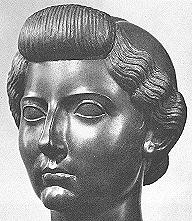Octavia
|
|
- For information about the Metal band commonly known as Octavia, see Octavia Sperati
Octavia was the name of three women of the Julio-Claudian Dynasty of ancient Rome: two were sisters of Augustus Caesar, and the younger was the daughter of Claudius and wife of Nero.

|
Octavia Thurina Major: The daughter of the Roman general, governor and senator Gaius Octavius from his first wife, Ancharia. Little is known of her and she lived in 40 BC. Plutarch states that she was a beautiful and admirable woman.
Octavia Thurina Minor: ( 69 - 11 BC.) The only daughter of her father's second marriage to Atia Balba Caesonia, the niece of the Roman Dictator Julius Caesar and full blood sister of Caesar Augustus. She was born in Nola, Italy.
Octavia Minor is one of the most prominent women in Roman history. She was respected and admired for the loyalty, nobility, humanity and maintaining her traditional feminine Roman virtues. This beautiful and remarkable woman lived at a time, where many succumbed to treachery and intrigue.
Much of her childhood, she spent travelling with her parents. Before 54 BC, her step-father, arranged for her to marry Gaius Claudius Marcellus. Marcellus was a man of consular rank, a member of the influential Claudian family and was a man worthy of her.
They had three children: Claudia Marcella Major, Claudia Marcella Minor and Marcus Claudius Marcellus. All three were born in Italy. Marcellus died in May 40 BC.
By a Senatorial decree, Octavia married Mark Antony, in a political alliance, in October 40 BC. Between 40 BC–36 BC, Octavia lived with him in his Athenian mansion. She raised her children by Marcellus; Antony's two sons and their two daughters: Julia Antonia Major and Julia Antonia Minor, who were born there. She had travelled with him to various provinces.
After 36 BC, Octavia returned to Rome with the children. On several occassions she acted as a political adviser and negotiator between her husband and brother.
Despite Antony's rejection, divorce in 32 BC and suicide in 30 BC, Octavia was the sole caretaker of the children. She became guardian to Cleopatra Selene, Ptolemy Philadelphus and Iullus Antonius, her ex-husband's remaining children. Octavia never remarried.
Augustus had adopted her son Marcus as his heir, but Marcus died of illness in 23 BC. Octavia had opened the Library of Marcellus in his memory, while her brother built a threatre in Rome in his honor. She never recovered from his death and retired from public life. Her final years were spent hiding in the dark and dressing in mourning.
She had woven clothes for her brother. Augustus built two monuments for his public works program, the Colonnades of Octavia and the Paragon of Virtue in her honor. She was one of the first Roman women to have coins minted in her image.
She died in 11 BC, sometime after her niece Julia Caesaris married Tiberius. Her beloved brother gave her the highest posthumous honours, built the Gate of Octavia in her memory, declared her as a goddess and built temples for her.
The image is Augustus' full blooded sister.
Claudia Octavia (March 40- 8 June 62 A.D.) was the daughter of Claudius and Messalina and the first wife of her step-brother Nero. As empress, Octavia was greatly admired and loved by the people of Rome, sparking great jealousy in Nero's ambitious mistress Poppaea Sabina. She persuaded Nero to divorce his wife on trumped up charges of adultery, and Octavia was sent into exile. This paved the way for Poppaea to become Empress instead. The appalled populace of Rome rioted at the news and paraded through the streets with statues of Octavia decked with flowers and calling for her return. A badly frightened Nero nearly agreed, but Poppaea intervened and forced him instead to sign Octavia's death warrant. According to Suetonius Octavia did not die easily. After several unsuccessful attempts, she was finally suffocated in a steam bath. Her head was cut off and taken back for Poppaea's viewing.de:Octavia nl:Octavia ja:オクタウィア pt:Octávia sv:Octavia
